Why Slovenia is content no more
- Published
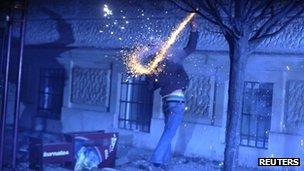
Violence has broken out at several of the anti-corruption rallies
Dozens of people have been arrested in Slovenia's second city, Maribor, after violence broke out at an anti-corruption rally.
The clashes, on Monday, took place as Slovenians took to the streets for a second week, calling for the resignation of the political elite they hold responsible for economic failure and rampant corruption.
Since withdrawing peacefully from Yugoslavia in 1991, Slovenia has seen its GDP double and was the only formerly communist country allowed into the eurozone in 2007. But the good news came to an end in 2008.
On Friday it entered a second dip of recession. Its severely indebted banks mean it may be the next country to resort to an EU bailout.
"We want the old elite that has been in power for the last 20 years to go," said Timi, a 20-year-old protester.
The election as president on Sunday of photogenic 49-year-old Social Democrat Borut Pahor, a former prime minister and model, is no solution to his country's woes, Timi said.
Mr Pahor's conciliatory style prevailed over the abrasive approach of his outgoing run-off opponent, Danilo Turk, an independent leftist.
Mr Pahor won 67% of votes though only a third of voters turned out to vote. His vision is vague but his rhetoric is calm and inclusive and he left his premiership last year without being noticeably enriched.
'Thieves!'
The largest of Monday's protests was in Maribor, where 10,000 people gathered in the main square calling for the resignation of the city's populist conservative mayor Franc Kangler, who faces several corruption charges which saw him stripped of his People's Party membership a fortnight ago.
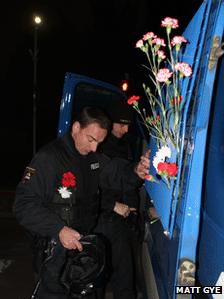
Some protesters gave carnations to police in Maribor
On the fringes of the crowd, a former member of Mr Kangler's campaign team admitted that it appeared his candidate had lost his way since gaining power in 2006, but he added that he was also not the criminal ogre portrayed by protesters.
After last Monday's protest, Mr Kangler said he would stay in his post, and then left for a 10-day holiday.
Other politicians whom protesters in Maribor and elsewhere want to see out of office are Janez Jansa, on trial for corruption in an arms scandal while he was prime minister from 2004 to 2008, and the mayor of the capital Ljubljana, Zoran Jankovic, who is also the main opposition leader.
Like Mr Kangler, neither has been found guilty in court.
At the front of the crowd nearest the Maribor council offices on Monday, a mob - composed largely of men in their early 20s, some masked - hurled insults, flares, stones and fireworks.
Some fireworks landed on balconies, threatening to set the building on fire. Protesters stepped forward to burn pictures of Mr Kangler on a hay bale bonfire.
All across the square, people chanted "Get out!" and "Thieves!"
At around 20:30, a police helicopter flew overhead and shortly afterwards tear gas was reportedly discharged to disperse the hooligan element.
One 26-year-old local policeman changing into riot gear said he personally knew perhaps 100 of the protesters he was policing.
A dozen people were injured but the response was milder than that a week ago. The use of tear gas shocked a normally peaceful Slovenia, which has never seen such violence, even under Yugoslavia's relatively mild brand of communism.
'Very aggressive'
"The police were very aggressive," says Magdelena, a 67-year-old artist, carrying a banner describing the situation as "Orwellian".
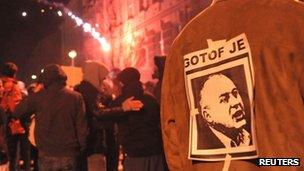
This poster of Mayor Franc Kangler on a protester's back reads "you are finished"
Protests against Mr Kangler began this autumn with outrage at the introduction of speed cameras.
Protesters say the income from the cameras benefits private contractors rather than the public purse.
For the most part the spirit in the crowd was good-humoured.
Many protesters were wearing carnations while one young woman called Gaja toured the crowd giving "free hugs".
But protesting peacefully does not eliminate anxiety.
"We are all afraid of what comes after we are rid of these corrupted politicians," says Katja, a 35-year-old arts producer, carrying a banner saying: "Honesty, trust".
Protesters bemoan the economic hardships they blame on the misrule and greed of their current crop of leaders.
At the same time, economists worry at the halting pace of reform, which may be prolonging the economic pain.
- Published30 November 2012
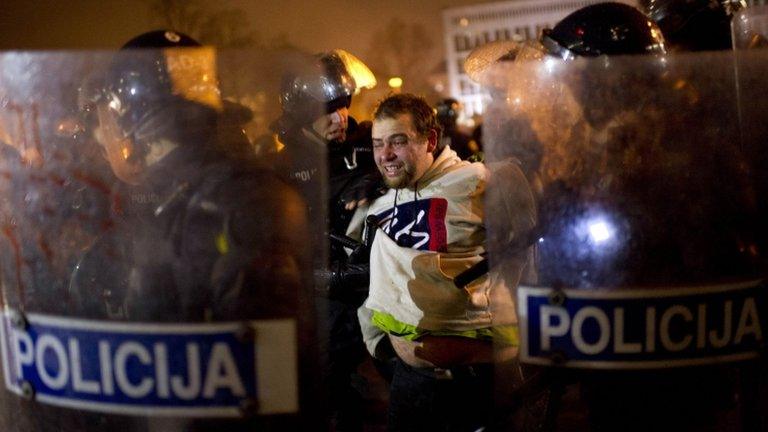
- Published3 December 2012
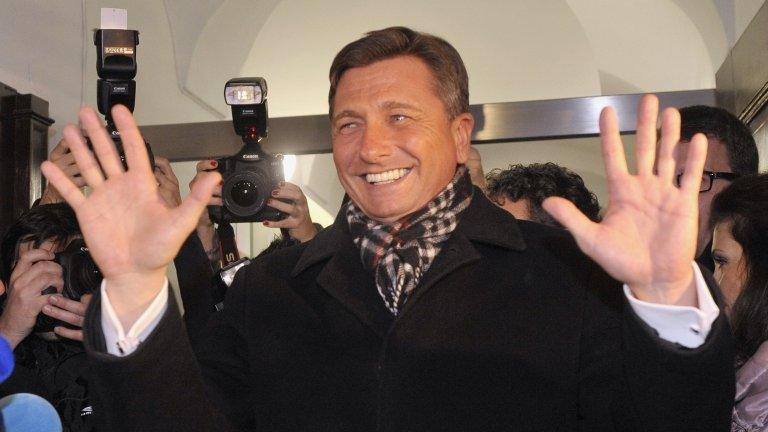
- Published21 September 2011
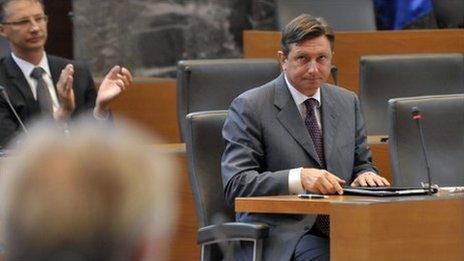
- Published13 March 2015